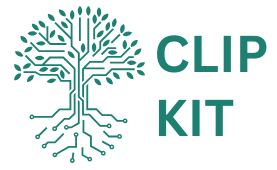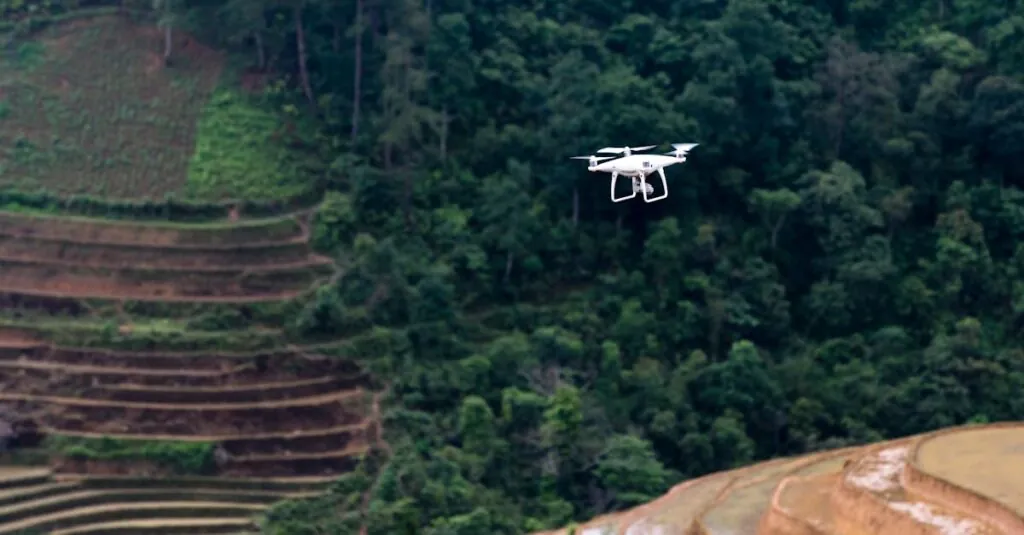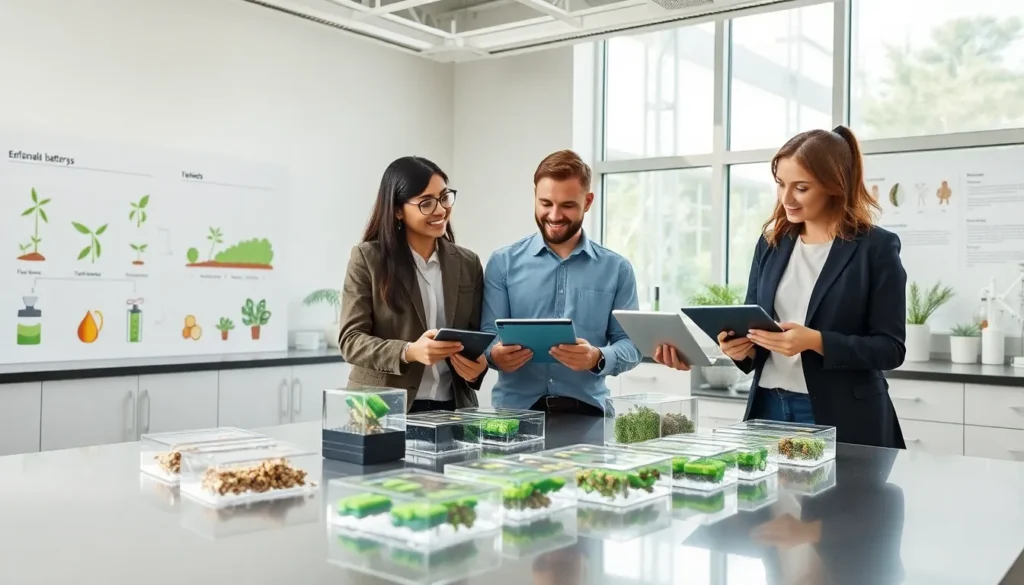Table of Contents
ToggleIn a world where farming often feels like a game of chance, precision farming tech swoops in like a superhero with a GPS and a mission. Imagine a farm where every seed knows its place and every drop of water is delivered with the precision of a barista crafting your morning coffee. This isn’t just wishful thinking; it’s the future of agriculture, where tech meets tillage to boost yields and minimize waste.
Overview of Precision Farming Tech
Precision farming technology leverages data integration to enhance agricultural practices. This technology encompasses tools like GPS, IoT sensors, drones, and data analytics software designed to optimize field management. Farmers use these tools to monitor crop health and soil conditions in real time.
GPS technology allows for accurate mapping of fields, identifying variations in soil type and moisture levels. By utilizing this information, farmers can tailor their planting strategies to specific field zones, ensuring optimal seed placement. IoT sensors provide continuous monitoring, offering valuable insights into environmental factors affecting crops.
Drones equipped with cameras and sensors capture high-resolution imagery of crop health. These aerial views help farmers assess plant growth and identify areas requiring attention. Data analytics software processes the information gathered, enabling informed decision-making.
The adoption of precision agriculture has shown promising results. According to the USDA, farmers can achieve yield increases of up to 20% through targeted interventions. Water usage decreases significantly, often by 30% or more, as farmers apply irrigation only where necessary.
Crop management becomes a more efficient process with these technologies. Combining various data points leads to enhanced insights, allowing for precise applications of fertilizers and pesticides. In essence, precision farming transforms traditional methods, enabling sustainable practices that benefit both farmers and the environment.
Through continuous advancement, precision farming technology represents the future of agriculture. Its integration into farming practices not only optimizes resources but also addresses challenges faced by farmers today. This shift towards data-driven agriculture exemplifies a commitment to innovation and efficiency.
Key Technologies in Precision Farming
Precision farming employs a variety of cutting-edge technologies to revolutionize agricultural practices. These innovations promote efficiency and sustainability throughout the farming process.
GPS and Drone Technology
GPS technology enables precise field mapping, which aids farmers in optimizing planting patterns. Drones equipped with high-resolution cameras gather real-time imagery, providing insights into crop health and growth stages. High-definition aerial views help farmers assess large fields quickly. This data supports timely interventions, improving crop management and yield potential. Moreover, the integration of these technologies enhances decision-making by improving accuracy in resource application. Enhanced efficiency can lead to increased productivity and reduced operational costs.
Sensors and IoT Devices
Sensors play a crucial role in monitoring soil moisture and nutrient levels, allowing for more informed irrigation practices. IoT devices collect data continuously, creating a comprehensive overview of field conditions. This information enables farmers to implement variable rate applications tailored to specific areas within a field. With real-time alerts, farmers can respond quickly to environmental changes, optimizing inputs and minimizing waste. The synergy between sensors and IoT enhances overall farm management, contributing to sustainable practices and improved crop performance.
Benefits of Precision Farming Tech
Precision farming technology offers significant advantages for the modern agricultural landscape. Adoption of these tools leads to impressive improvements in various farming practices.
Increased Crop Yield
Higher crop yields result from precise planting strategies and optimized resource use. GPS technology ensures that farmers plant seeds at the optimal depth and spacing. Sensors monitor crop health in real time, allowing for timely interventions. The USDA reports that precision farming methods can boost yields by as much as 20%. Drones help farmers identify underperforming areas quickly. Targeted solutions allow for adjustments that enhance productivity at all stages of growth.
Sustainable Resource Management
Sustainable farming practices stem from effective resource management enabled by precision technology. Sensors track soil moisture levels accurately, minimizing over or under-irrigation. Farmers can apply fertilizers and pesticides at variable rates, tailoring treatments based on specific crop needs. This precision reduces waste and lessens environmental impacts significantly. Efficient water usage, coupled with accurate nutrient application, promotes sustainability. As a result, overall farm productivity increases while conserving valuable resources.
Challenges and Limitations
Despite the significant advantages of precision farming technology, several challenges and limitations persist. Understanding these issues can help assess its overall effectiveness.
High Initial Costs
Implementing precision farming technology requires substantial financial investment. This includes purchasing advanced equipment such as GPS systems, drones, and sensors. Farmers may also need to allocate funds for ongoing maintenance and software subscriptions. Smaller operations often find the initial costs prohibitive, which can hinder widespread adoption. Financial constraints can lead to inequalities in access, creating a technology divide between large and small farms. Without external support or incentives, many farmers struggle to justify the upfront expense against potential long-term gains.
Data Privacy Concerns
Data privacy remains a significant issue in precision farming. As farmers utilize connected devices, vast amounts of sensitive information become available, including field data and operational practices. Third-party companies often collect and analyze this data, raising concerns about ownership and usage. Farmers worry about the potential for data exploitation and the unauthorized sharing of their proprietary information. Ensuring data security and establishing clear guidelines is essential for building trust in technological solutions. Addressing these privacy concerns upfront can facilitate a broader acceptance of precision farming technology.
Future Trends in Precision Farming Tech
Emerging trends in precision farming tech promise to reshape agriculture significantly. Increased adoption of AI-driven analytics allows farmers to make data-backed decisions swiftly. Machine learning algorithms enhance crop management by analyzing historical data for better forecasting and resource allocation.
Expansion in the use of drone technology supports more targeted interventions. Drones equipped with thermal sensors can detect plant stress, enabling timely irrigation adjustments. This capability helps optimize water usage and improves overall crop health.
Integration of blockchain technology addresses data security and transparency concerns. Farmers can securely share their data with stakeholders, while ensuring ownership remains intact. This promotes trust among producers and consumers alike.
Utilization of robotics is on the rise. Autonomous tractors and robotic harvesters improve efficiency and reduce labor costs. These innovations streamline operations, particularly during peak agricultural seasons.
Advancements in sensor technology increase real-time monitoring capabilities. Soil sensors gauge moisture and nutrient levels accurately, providing actionable insights for irrigation and fertilization. By fine-tuning these practices, farmers maximize their yield while conserving resources.
Collaboration between tech companies and agricultural experts drives the development of user-friendly platforms. Simplified software solutions provide farmers with easy access to vital data insights, fostering better decision-making.
Sustainable practices will gain prominence as environmental concerns rise. Precision farming technology facilitates proper resource management and minimizes environmental impacts significantly. Adoption of these technologies supports a more sustainable agricultural future, aligning economic viability with environmental stewardship.
Conclusion
Precision farming technology is reshaping the agricultural landscape by promoting efficiency and sustainability. Its ability to optimize resource use while increasing crop yields is a game changer for farmers. As advancements continue, these technologies will likely become more accessible and user-friendly, empowering even smaller operations to reap the benefits.
The future of agriculture hinges on the integration of innovative solutions that not only enhance productivity but also prioritize environmental stewardship. With the ongoing development of AI, drones, and advanced sensors, precision farming is set to lead the way in creating a more sustainable and efficient agricultural system. The commitment to harnessing these technologies will ultimately benefit farmers and the planet alike.




